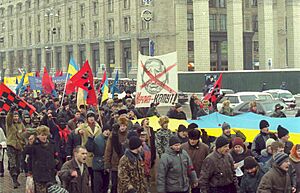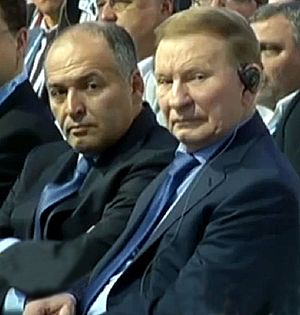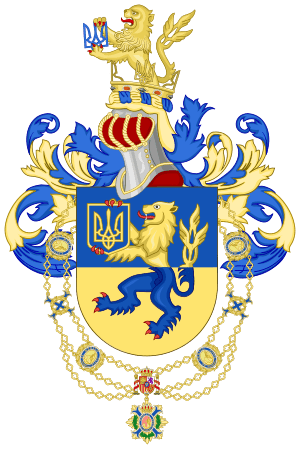Leonid Kuchma facts for kids
Quick facts for kids
Leonid Kuchma
|
|
|---|---|
|
Леонід Кучма
|
|
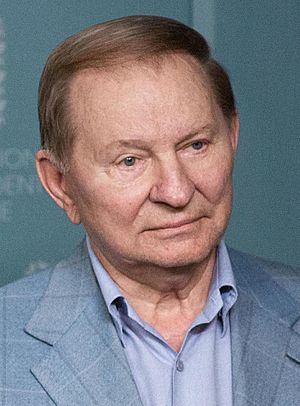
Kuchma in 2019
|
|
| 2nd President of Ukraine | |
| In office 19 July 1994 – 23 January 2005 |
|
| Prime Minister | Vitaliy Masol Yevhen Marchuk Pavlo Lazarenko Valeriy Pustovoitenko Viktor Yushchenko Anatoliy Kinakh Viktor Yanukovych |
| Preceded by | Leonid Kravchuk |
| Succeeded by | Viktor Yushchenko |
| 2nd Prime Minister of Ukraine | |
| In office 13 October 1992 – 22 September 1993 |
|
| President | Leonid Kravchuk |
| Deputy | Ihor Yukhnovskyi Yukhym Zvyahilsky |
| Preceded by | Valentyn Symonenko (acting) |
| Succeeded by | Yukhym Zvyahilsky (acting) |
| Representative of Ukraine in the Trilateral Contact Group on Ukraine | |
| In office 3 June 2019 – 28 July 2020 |
|
| President | Volodymyr Zelenskyy |
| General Director of Yuzhmash | |
| In office November 1986 – 13 October 1992 |
|
| Preceded by | Oleksandr Makarov |
| Succeeded by | Yuriy Alekseyev |
| People's Deputy of Ukraine | |
| In office 15 May 1990 – 15 July 1994 |
|
| Constituency |
|
| Personal details | |
| Born | 9 August 1938 Chaykino, Chernigov Oblast, Ukrainian SSR, Soviet Union |
| Political party | Independent (1991–present) |
| Other political affiliations |
Communist Party of the Soviet Union (1960–1991) |
| Spouse | |
| Children | Olena Pinchuk |
| Alma mater | Dnipropetrovsk National University |
| Signature |  |
Leonid Danylovych Kuchma (Ukrainian: Леонід Данилович Кучма; born 9 August 1938) is a Ukrainian politician who was the second president of Ukraine. He served from 1994 to 2005. Kuchma is the only president of Ukraine to be elected for two terms. His time as president was known for the rise of very wealthy business leaders called Ukrainian oligarchs. His presidency also faced several major controversies.
After a successful career in the aerospace industry, Kuchma entered politics in 1990. He was elected to the Verkhovna Rada, which is the parliament of Ukraine. He later served as Prime Minister of Ukraine from 1992 to 1993.
Kuchma won the 1994 presidential election and was re-elected in 1999. During his time in office, Ukraine's economy began to grow after a long period of decline. However, his presidency was also marked by scandals. One major event was the "Cassette Scandal" and the disappearance of journalist Georgiy Gongadze. These events led to large protests known as Ukraine without Kuchma.
After his presidency, Kuchma stayed involved in politics. From 2014 to 2020, he helped with peace talks about the War in Donbas. Kuchma's time as president is seen as a very important and controversial period in Ukraine's history.
Contents
Early Life and Education
Leonid Kuchma was born on August 9, 1938, in the village of Chaikyne, Ukraine. His father, Danylo, fought in World War II and died from his wounds when Leonid was four years old. His mother, Paraska, worked on a collective farm called a kolkhoz.
Kuchma went to school in a nearby town. He later studied at Dnipropetrovsk National University. In 1960, he graduated with a degree in mechanical engineering, specializing in aerospace technology.
Career Before Politics
After college, Kuchma worked for the Yuzhnoye Design Bureau, a company that designed rockets and spacecraft. He worked at the Baikonur cosmodrome, a major space launch center. By the time he was 38, he became a leader in the Communist Party at his workplace.
In 1986, Kuchma became the general director of the company, Yuzhmash. This was a very important job in the Soviet Union's machine-building industry.
In 1990, he was elected to the Verkhovna Rada, Ukraine's parliament. Two years later, he became the Prime Minister of Ukraine. He left this job after a year to run for president.
President of Ukraine (1994–2005)
Kuchma became president in 1994 after winning the election against the first president, Leonid Kravchuk. He promised to improve the economy by building stronger ties with Russia and making reforms. He won with strong support from eastern and southern Ukraine.
He was re-elected for a second term in 1999. During his presidency, some newspapers that opposed him were closed. The mysterious deaths of some political opponents, like Viacheslav Chornovil, also happened during this time.
-
Results in the second round of the 1994 presidential election: Blue shows votes for Leonid Kuchma, and orange shows votes for Leonid Kravchuk.
Domestic Policy
In 1994, Kuchma started major economic reforms. These included selling state-owned companies, cutting government spending, and changing the banking system. The International Monetary Fund (IMF) provided a loan to help with these changes.
His second term was more difficult. He was accused of being involved in the 2000 disappearance of journalist Georgiy Gongadze, though Kuchma has always said he was not involved. Critics also said he limited the freedom of the press.
From 2002 to 2005, his prime minister was Viktor Yanukovych.
Foreign Policy
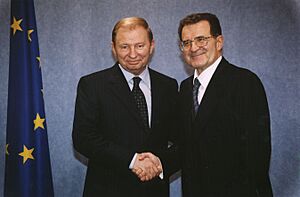
Kuchma wanted Ukraine to have good relationships with many countries. He called this a "multi-vector" policy, meaning he worked with Russia, Europe, and the United States.
He signed a friendship treaty with Russia and supported cooperation with other former Soviet republics. At the same time, he also signed a special partnership with NATO and talked about Ukraine possibly joining the alliance one day. He also said Ukraine wanted to get closer to the European Union.
Under his leadership, Ukrainian soldiers took part in the Iraq War.
The Cassette Scandal
A major controversy during Kuchma's presidency was the "Cassette Scandal." From 1998 to 2000, one of Kuchma's bodyguards, Mykola Melnychenko, secretly recorded conversations in the president's office.
When these tapes were released, they caused a huge scandal. On the recordings, a voice that sounded like Kuchma's seemed to be involved in illegal activities. The most serious was a discussion about the journalist Georgiy Gongadze, who had disappeared in September 2000.
The release of these tapes led to massive protests called "Ukraine without Kuchma." Kuchma said that it was his voice on the tapes but claimed they were edited to change the meaning. The scandal badly damaged his reputation both in Ukraine and in other countries.
The Orange Revolution
Kuchma's role in the 2004 Ukrainian presidential election is complex. The main candidates were Viktor Yanukovych, who Kuchma supported, and Viktor Yushchenko.
After the final vote, Yanukovych was declared the winner. However, many people believed the election was unfair. This led to huge, peaceful protests across the country, which became known as the Orange Revolution.
Kuchma was asked to declare a state of emergency, but he refused. Instead, he acted as a mediator between Yanukovych and Yushchenko to find a peaceful solution. Eventually, the election results were cancelled, and a new vote was held, which Yushchenko won.
Life After the Presidency
After leaving office, Leonid Kuchma remained an important figure in Ukraine.
From 2014 to 2020, he played a key role in peace talks for the conflict in eastern Ukraine. He represented Ukraine in the Trilateral Contact Group on Ukraine, which tried to find a peaceful end to the fighting. He helped sign the Minsk II agreement in 2015, a plan to stop the conflict.
When Russia began its full-scale invasion of Ukraine in 2022, Kuchma announced he would stay in the country to help defend it. He said, "I stay at home, in Ukraine, because we are all in our Homeland... And we will defend it together until the very victory."
Family and Personal Life
Leonid Kuchma married Lyudmyla Talalayeva in 1967. She is known for her charity work, especially supporting children and the Paralympic movement in Ukraine.
They have one daughter, Olena Pinchuk. She is married to Viktor Pinchuk, a well-known businessman and philanthropist. His foundation supports many educational and cultural projects in Ukraine.
In his free time, Kuchma enjoys playing the guitar and the card game preferans. In 2003, he published a book titled Ukraine is Not Russia.
Awards and Honors
Kuchma has received many awards from Ukraine and other countries for his work.
- Ukrainian Honors
- Honorary Citizen of the Donetsk Oblast (2002)
- Order of the Ukrainian Orthodox Church
- Foreign Honors
- Knight Grand Cross of the Order of Merit of the Italian Republic (Italy, 1995)
- Order of Merit for the Fatherland, 1st class (Russia, 2004)
- Grand Cross of the Order of Vytautas the Great (Lithuania, 1996)
- Order of the Golden Eagle (Kazakhstan, 1999)
- Grand Cross of the Order of the Star of Romania (Romania, 2000)
See also
 In Spanish: Leonid Kuchma para niños
In Spanish: Leonid Kuchma para niños
 | William L. Dawson |
 | W. E. B. Du Bois |
 | Harry Belafonte |




